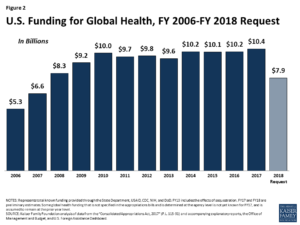
Global health is defined as “the area of study, research, and practice that places a priority on improving health and achieving equity in health for all people worldwide”, often emphasizing problems that transcend national borders or have a global political or economic impact. As a comparison, international health, which is a branch of public health similar, but not identical to global health, is focused on developing nations and foreign aid effort by developed countries. The main international agencies responsible for global health is the World Health Organization (WHO), UNICEF and the World Food Programme, as well as the United Nations with the declaration of the Millennium Development Goals as well as the Sustainable Development Goals most recently. However, obviously many countries as well as NGOs have a crucial role in supporting global health efforts across the world.
Funding of global health is complex and multifaceted, with financing coming from a combination of governments, private foundations, individuals, and the private sector. Funds are managed and pooled through bilateral aid agencies of donor governments, such as USAID and DFID in the UK; inter-governmental organizations as the European Union and the World Bank; global health partnerships (GHPs) such as the Global Fund and the Global Alliance for Vaccines and Immunization (GAVI), and non-governmental organizations and private foundations such as the Bill and Melinda Gates Foundation. Finally, funds are spent either directly by recipient governments or by the organizations mentioned above themselves. As an example, the WHO is funded by assessed contributions, that are required from member states, calculated based on their economic status and population, as well as by voluntary contributions from both member and non-member states and private donors. In 2011, 80% of the total budget of WHO came from donor governments, but only 25% came from assessed contributions. The largest donor was the US government, followed by the Bill and Melinda Gates Foundation. While originally most of public health funding came from governments and inter-governmental organizations, their contribution gradually decreased in comparison to private foundations and other non-governmental sources. By 2009, the Bill and Melinda Gates Foundation became a bigger international health donor than all governments except for the United States and the United Kingdom. Many have argued that this reliance on a small number of key donors makes global health funding vulnerable to sudden changes, and leads to inefficient usage of available funds, focusing disproportionately on a small set of diseases, such as HIV, malaria and TB.

While total global health funding has been increasing in the last several decades, contributions from governments such as the US and the UK have been flat since 2010. Recently, political support for nationalism and isolationism arose and spread in developed countries, capitalizing on societal fears and backlash of the negative impact of globalization in specific parts of the population, exemplified by the election of Donald Trump in the US and Brexit in the UK. These nationalist and isolationist politics consider global health simply as a form of foreign aid, and as such a part of globalization which redistributes resources from developed countries to developing countries, depriving their own citizens of needed funds while providing “handouts” to other countries. Such views lead to a devaluation and decrease of contributions to global health. For example, the FY 2018 budget, proposed by President Trump, requests only $7.9 billion dollars for global health, which is a 24% reduction from the amount spent in FY 2017. Similarly, the DFID (Department for International Development) of the UK announced a 22% cut in funding for its programs specific to HIV/AIDS. These and similar reductions in government contributions to global health funding worry public health experts, and put an even bigger burden on private foundations and other non-governmental organizations to step up to sustain global health gains. Despite these efforts, developing countries are already feeling the effects of reduced support, both economically as well as psychologically, in terms of increased uncertainty, and a feeling of being abandoned.
Currently, in the US, charitable contributions represent roughly 2.1% of the Gross Domestic Product (GDP), of which a small proportion is donated for global health. One of the incentives for donors to contribute is that their payments are tax-deductible, if they choose to itemize their expenses on their tax return. The U.S. Congress has just passed a new tax bill which doubles the amount of standard deductions available without itemizing to $12,000 for individuals and $24,000 for married couples. Why is that a problem? Well, taxpayers only itemize their deductions if their qualifying expenses, including charitable donations, exceed the standard deduction. This means that many fewer taxpayers will choose to itemize their deductions (from 46 million to 20 million taxpayers, according to the Tax Policy Center), and will therefore have less of an incentive to contribute charitable donations, including for global health. People will still donate for charitable purposes, but less of them, and potentially smaller amounts than before. This might results in global health financing to be squeezed from both sides, with decreasing government support as well as less funding available from private foundations.
So what can we do to protect all the gains that global health has achieved in the last 50-100 years? First of all, I don’t consider myself a health policy expert, and don’t claim to have the right solution for this sticky problem. I believe that one key point is to convince large segments of the population that global health is a necessity that we must invest in, and not a luxury that we cannot afford. Investments in global health are crucial to prevent outbreaks of infectious diseases in developing countries that can quickly spread to developed countries, as the 2014 Ebola outbreak has shown. In addition, health problems in developing countries lead to regional economic and ultimately political instability that then require even larger investments to resolve. In our globalized world, we can no longer assume that any one country can isolate itself from events in any other country in the world – in fact, this has been an incorrect assumption even in the past, with accelerated spread of effects today. Voters who understand this would be immune to nationalist and isolationist propaganda, and would vote for representatives who would prioritize funding global health. Well, you might say that will take some time :-). In the meantime, it is up to those of who us who understand these issues and have the means to help, to support the organizations working on the ground for global health. In the US, charitable contributions paid before December 31 qualify for the 2017 tax year. Therefore, there are still a few days to send your contributions to eligible and relevant organizations. Let’s make sure that the Grinch does not steal global health!

Comments